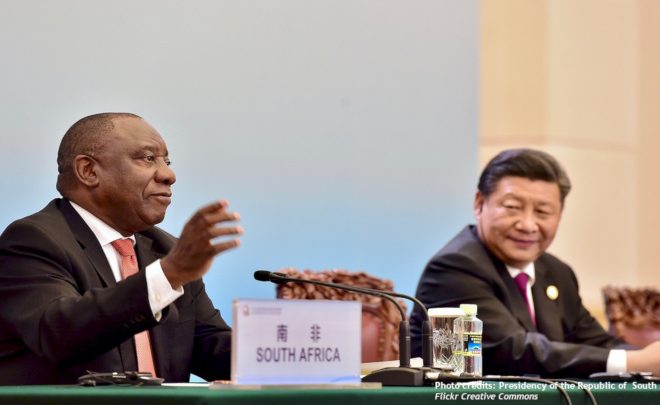A New Era of Cooperation? Implications of the Forum on China-Africa Cooperation

President Cyril Ramaphosa, President Xi Jinping at the FOCAC
This year marks the 40th anniversary of reform that contributed to the transformation of the People’s Republic of China (PRC) into one of the world’s leading economic powerhouses. By embracing new economic principles and designing an initiative approach to trade, millions of Chinese citizens were provided with the means to lift themselves out of poverty. At the same time, it heralded a new form of Chinese engagement with the wider world, creating new bilateral and multilateral connections. This week also marks the third summit of the Forum on China-Africa Cooperation (FOCAC), presided over by Chinese President Xi Jinping in Beijing. The timing and the importance of the summit indicate elements of the involving relationship between China and its African partners.
Opening Up and Reform
The foundations of China’s reform and opening up process were announced at the third plenary session of the 11th Central Committee of the Communist Party of China (CPC) in December 1978. With the excesses of the Cultural Revolution still fresh in their minds, the CPC and the leadership of Deng Xiaoping sought to institute a system of gradual, directed change. Among the first areas to experience reform was the moribund agricultural system which was initiated to boost food security. The result was a gradual embrace of free market principles that would pave the way for a later restructuring of China’s economic role in the world.
A significant attribute of the implementation of “Socialist market economy with Chinese Characteristics” was a willingness to undertake and learn from experiments. Under Deng’s tutelage, Shenzhen and several other cities in Southern China, become special economic zones (SEZs). Shenzhen and Shantou near Hong Kong, Zhuhai near Macao, Xiamen across the Straits from Taiwan. All of these regions were experiencing economic upturns in the early 1980s. SEZs were to be administered differently from other parts of the PRC, foregoing many of the structures inherent in a planned economy to court for foreign investment, as well as to capitalize on rapid growth rates.
China Goes Forth
The relative success of the SEZs, as well as the rapid economic growth of the rest of East Asia, encouraged the Chinese leadership to deepen reforms. Over time restrictions on business were relaxed and, by the 1990s, free trade principles in China became increasingly entrenched. This also led to an outpouring of Chinese business into the rest of the world, especially Africa. Prior to the demand for new resources created by China’s booming industries and growing middle class, Beijing’s engagement with African states was driven by ideological considerations, opposition to the legacy of colonialism and a desire to gain diplomatic recognition for the Chinese. However, during the 1990s trade between China and African states increased by 700 percent, making the PRC one of the African continent’s biggest trading partners. Since 2000, this process has greatly accelerated and China has become the destination for 15 to 16 percent of sub-Saharan Africa’s exports and the source of 14 to 21 percent of the region’s imports, according to estimates by the World Bank.
Sino-African relations have deepened not only economically, but also in the diplomatic and security spheres. Chinese military personnel have been deployed to South Sudan and Mali, and in August 2017, China established its first overseas military base in Djibouti. In addition, Beijing has been involved with counterpiracy and evacuation efforts in Somalia and Libya respectively. These recent engagements make clear that Beijing’s economic and political considerations have become increasingly intertwined.
The 2018 FOCAC summit comes on the heels of a visit by President Xi to Senegal, Rwanda, Mauritius and South Africa, where he met with fellow heads of state. This was the first international visit by Xi since assuming his second term of office in March of this year. Africa was also the first foreign destination he sought out upon when assuming the reins of state, with a maiden tour that included the Republic of Congo and South Africa. Such visits, though they often receive little attention in West, are not uncommon: top-level Chinese officials have in the past decade made over 80 official visits to Africa.
Sino-African relations appear set to take an even more prominent role in Chinese foreign policy and can perhaps prove instructive about the future of Chinese engagement with the wider world. This fusion of investment with security considerations has already featured in Xi’s rhetoric. At the last FOCAC summit in 2015, he pledged his support for African development and security initiatives, stressing in his speech; “poverty is the root cause of chaos while peace is the guarantor of development”. Whatever the outcome of this year’s summit, it seems entirely plausible that in future China’s special relationship with Africa will be used as a both an example and a testing ground for a ‘development policy with Chinese characteristics’ within which Beijing will endeavor to promote its understanding of the nexus between development and security.
In early 2015, A PLA Daily article commented that China has set an example in helping Africa’s development for the world. Xi’s most recent speech at the 2018 Beijing Summit of FOCAC underlined that China welcome African countries aboard the express train of China’s development, which also suggested that the nation seeks to become an economic and governance model for Africa. Despite the speeches emphasizing stronger ties between China and Africa, the relations still rest primarily on bilateral ties and not on engagement with multinational blocks. Chinese diplomacy is also receiving criticism from smaller partner states for being too high-handed. African audiences are especially wary of tactics harkening back to the period of colonial and imperial domination, and the Chinese leadership must be cautious not to be perceived as repeating the mistakes of the past.